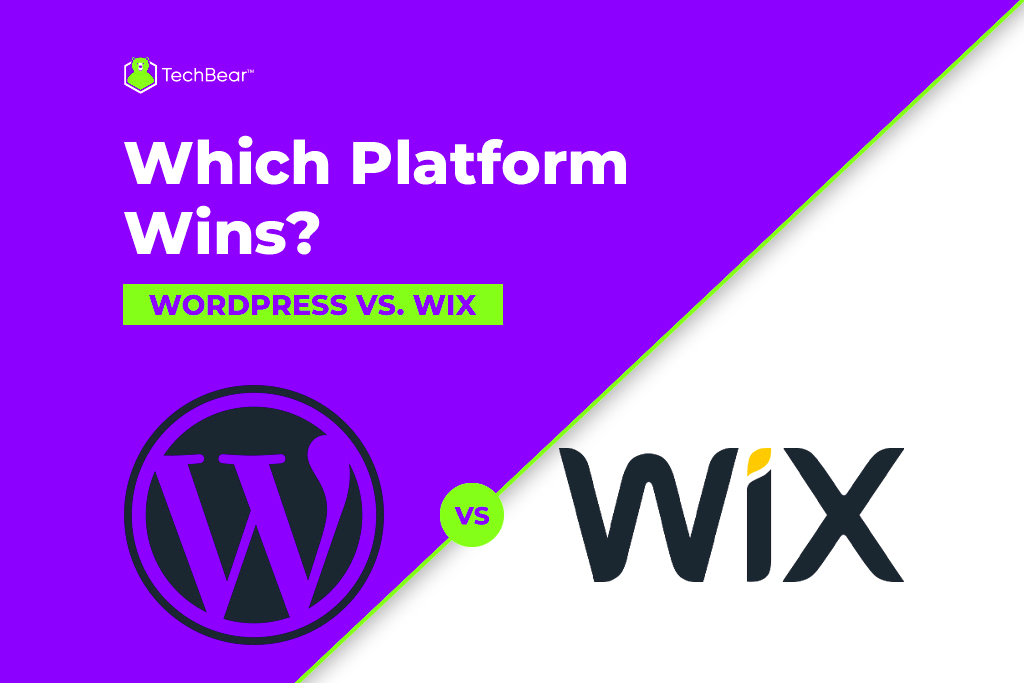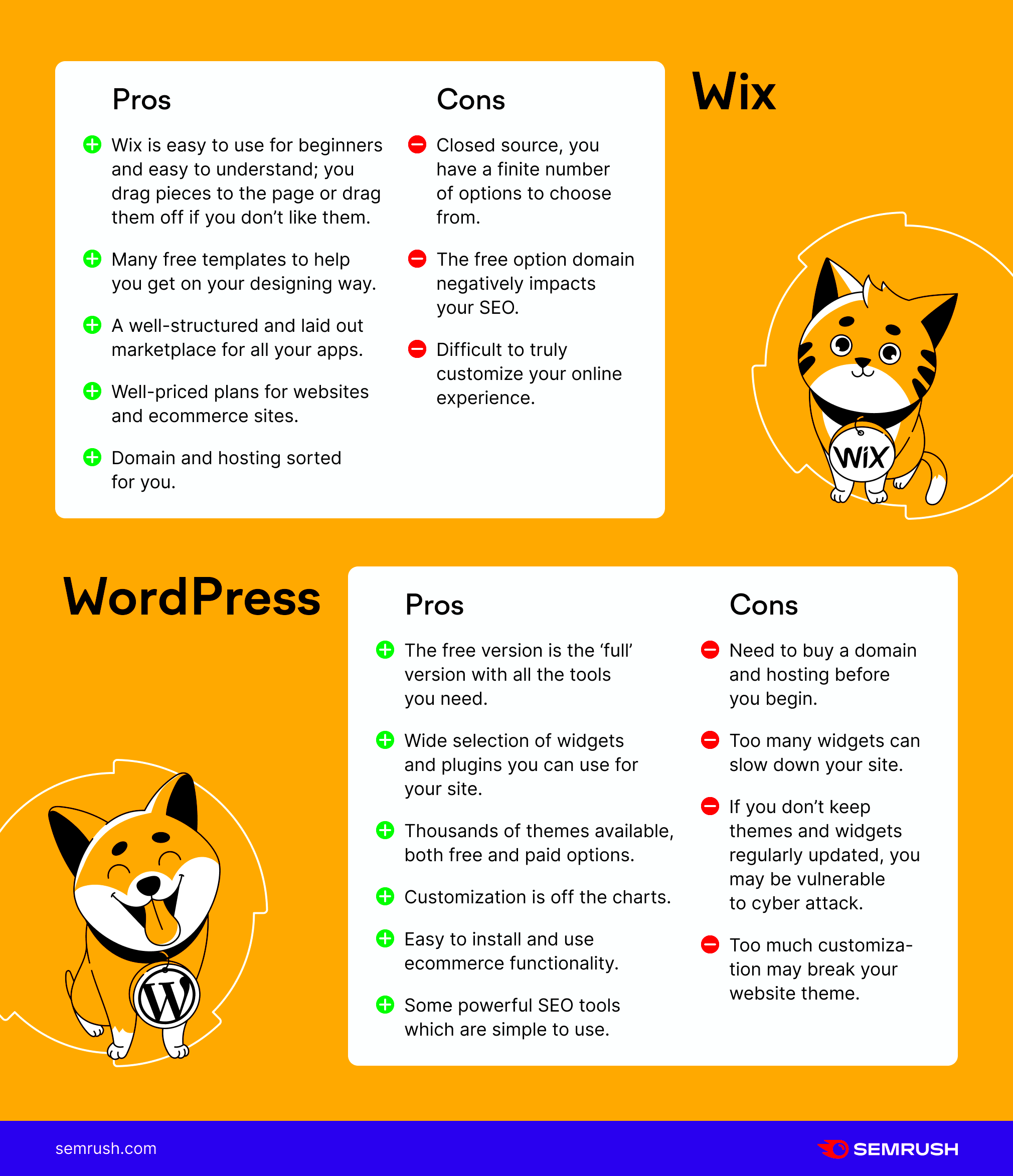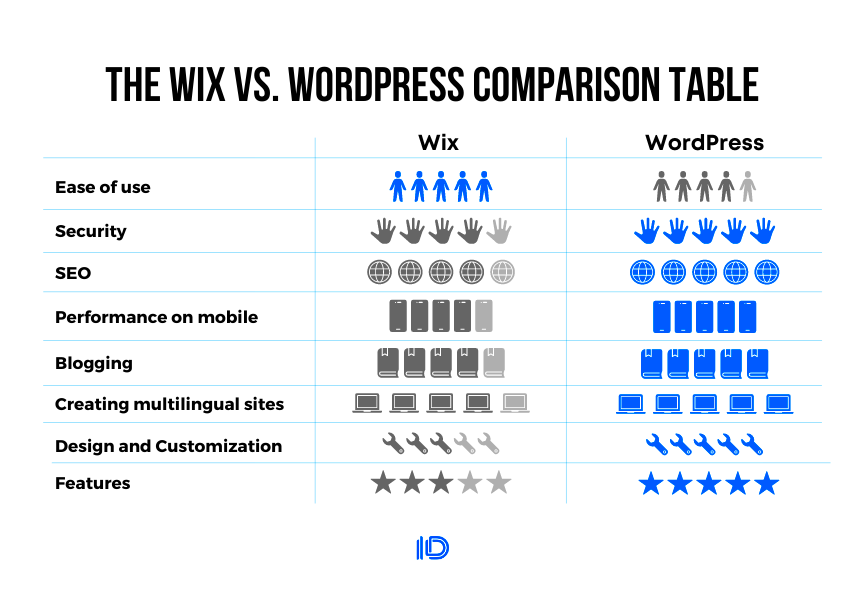When it comes to building a website, two platforms often come up in discussions: Wix and WordPress. Each has its unique strengths and weaknesses, catering to different types of users and websites. Whether you are a small business owner, a freelance artist, or someone looking to start a blog, the choice between these platforms can be daunting. In this post, we’ll explore the intricacies of Wix and WordPress to help determine which platform might be the best fit for your needs.
Overview of Wix

Wix is a cloud-based website builder that has attracted millions of users over the years, particularly those who prioritize simplicity and ease of use. With its drag-and-drop interface, Wix enables anyone—regardless of technical expertise—to create a visually appealing website in no time. Let’s delve into the features that make Wix a popular choice:
- User-Friendly Interface: Wix’s intuitive design allows users to simply drag and drop elements where they want them. This makes the learning curve minimal for beginners.
- Templates Galore: With hundreds of customizable templates, Wix provides a stunning starting point for your site.
- App Market: You can extend your site’s functionality using various add-ons from Wix’s vast app marketplace.
- SEO Tools: While not as robust as WordPress, Wix offers basic SEO tools to help improve your site’s visibility.
- Hosting Included: Wix hosts your site for you, which means you don’t have to worry about finding a separate hosting provider.
That said, Wix might not be the best choice for everyone. There are limitations to customization and scalability that may pose challenges for more advanced users. If you’re on the fence about Wix, let’s look at how it stacks up against WordPress in terms of flexibility, control, and functionality.
Overview of WordPress

WordPress, launched in 2003, has grown from a simple blogging platform to a powerful content management system (CMS) that now powers over 40% of all websites on the internet. What’s the secret sauce behind its popularity? Well, it’s more than just being user-friendly; it’s about flexibility, scalability, and a vast ecosystem.
At its core, WordPress is incredibly versatile. Whether you want to launch a personal blog, a business website, or even an online store, WordPress has the tools and themes to get you there. Here are some key features:
- Customization: With thousands of themes and plugins, you can customize your site to look and function just how you want it.
- SEO-Friendly: Many features come built-in, or can easily be added, making it easier to optimize your site for search engines.
- Community Support: Being open-source, WordPress has a huge community that provides forums, tutorials, and support.
- Scalability: As your business grows, WordPress can grow with you. It can handle everything from small blogs to large corporate websites.
However, with great power comes some complexity. Yes, you can build something fantastic with WordPress, but it may require a steeper learning curve compared to other platforms.
Ease of Use: Wix vs WordPress
When it comes to building a website, ease of use can make all the difference, especially if you’re not a tech-savvy person. Enter Wix and WordPress: two juggernauts in the web-building space, but they cater to different user needs.
Wix is often celebrated for its drag-and-drop simplicity. You don’t need to know anything about coding; just choose a template, drag in your images, text, and voilà! Here are some perks:
- User-Friendly Interface: The layout makes it super easy to edit and customize, even for beginners.
- Pre-built Templates: Thousands of templates ready for various industries save time and effort.
- All-in-One Solution: Hosting and domain management come bundled with your plan, so there’s less hassle involved.
On the other hand, WordPress requires a bit more effort to get started. While the basic functionality is straightforward, customizing your site may involve a learning curve. Here’s what to consider:
- Flexible but Complex: Once you grasp it, the possibilities are endless, but initial setup and customization can be daunting.
- Manage Hosting Separately: You need to find hosting and manage domain setup yourself, which can be confusing for first-timers.
- Steeper Learning Curve: While building a basic site is easy, advanced features may require coding knowledge or time spent learning the platform.
In the end, the choice comes down to what you value more: simplicity or flexibility. If you want to get up and running quickly, Wix might be for you. But if you’re looking for a robust, customizable platform that can grow with you, WordPress could be the better option.
5. Customization Options
When it comes to building your online presence, customization is key. Both Wix and WordPress offer unique approaches to customization, appealing to different types of users. Let’s break it down.
Wix provides a user-friendly, drag-and-drop interface that allows you to design your website visually. With hundreds of templates to choose from, you can easily tweak colors, fonts, and layouts without any coding knowledge. It’s fantastic for beginners who want to create visually appealing sites quickly. However, the downside is that while you can customize elements within your chosen template, switching templates after you’ve built your site can be challenging.
On the other hand, WordPress is renowned for its extensive customization options. With thousands of themes and plugins available, the possibilities are nearly limitless. From changing the appearance to adding complex functionalities, WordPress allows you to modify nearly every aspect of your website. If you have coding knowledge, you can even create your own themes or plugins tailored specifically to your needs, giving you an edge in personalization. However, this flexibility can come with a steeper learning curve.
In summary:
- Wix: Great for beginners, visual editing, limited template switching.
- WordPress: Highly customizable with themes and plugins, ideal for more advanced users.
Ultimately, your choice depends on how much customization you need and your level of expertise. If you want straightforward and quick designs, go for Wix. If you’re looking for powerful customization and don’t mind investing time in learning, WordPress is the way to go.
6. Pricing and Plans
When considering which platform to choose, pricing often plays a pivotal role. Wix and WordPress have different pricing structures that cater to varying needs and budgets.
Wix operates on a subscription model with multiple pricing tiers. Here’s a quick look at their general pricing:
| Plan | Price (Monthly) | Best For |
|---|---|---|
| Free Plan | $0 | Basic website with Wix-branded domain |
| Combo Plan | $14 | Personal use, no ads |
| Unlimited Plan | $18 | Freelancers, small businesses |
| Business Plan | $23 | Online stores |
Wix’s plans include hosting, basic storage, and customer support, which simplifies things for users. However, if you want advanced features or extra storage, you’ll need to opt for higher-tier plans.
On the flip side, WordPress is a bit more nuanced. The WordPress software itself is free, but there’s a need to factor in hosting costs, which can vary significantly. Here’s a breakdown of typical expenses:
- Hosting: Starts around $5/month for basic shared hosting but can go up to $30/month or more for managed hosting.
- Domain: Usually around $10-$15/year.
- Premium Themes: Can range from $30 to $100 one-time fees.
- Plugins: Many are free, but premium ones can cost $5 to $100 per year.
When you look at the long-term costs, WordPress can be economical, especially if you’re tech-savvy and can manage the setup yourself. However, for those who prefer an all-in-one package, Wix might be a more convenient—but slightly pricier—option.
In conclusion, think about your budget, the level of commitment you’re willing to make, and what features you need, as both platforms offer their unique pricing models that can accommodate various needs.
SEO Capabilities
When it comes to building a website, having strong SEO capabilities is crucial for attracting visitors and achieving your business goals. Both Wix and WordPress offer features tailored toward improving your site’s search engine optimization, but their approaches and effectiveness can differ significantly.
Wix is often praised for its user-friendly interface, making it easy for beginners to set up their websites without needing to understand the complexities of SEO. The platform automatically generates some SEO-friendly URLs and offers built-in tools to guide you through optimizing your site. Additionally, Wix provides a handy SEO Wizard that walks users through important steps, including:
- Setting up meta descriptions
- Customizing page titles
- Adding alternative text for images
However, seasoned users may find some limitations in Wix’s SEO capabilities, especially when it comes to advanced optimizations and finer control over the technical aspects of SEO.
On the flip side, WordPress takes the crown for SEO flexibility and power. As an open-source platform, it allows for deep customization and the installation of plugins like Yoast SEO and All in One SEO Pack. These plugins provide comprehensive features such as:
- Content analysis and keyword optimization
- XML sitemap generation
- Social media integration
Moreover, WordPress gives users more control over URL structures, allowing you to sculpt your permalinks for maximum SEO benefits. However, the learning curve can be steeper compared to Wix.
So, if SEO is your top priority and you’re ready to dive into the nitty-gritty of optimization, WordPress might just be your best bet. But if ease of use is what you’re after, Wix might be the way to go.
Performance and Reliability
When you’re choosing a platform for your website, performance and reliability should be at the top of your checklist. A slow-loading website or one that often experiences downtime can frustrate visitors and hurt your brand’s credibility. So, how do Wix and WordPress fare in this arena?
Wix operates on a centralized hosting service, which means users don’t need to worry about finding their own hosting provider. This can be a double-edged sword. While it simplifies the process, Wix’s shared hosting setup may lead to slower load times, especially when your site scales up or during high traffic periods. Nonetheless, for average users, Wix performs decently for small to medium-sized websites. The platform also employs measures to ensure uptime, although it being a shared platform means there’s a risk of performance dips.
WordPress, on the other hand, offers users the freedom to choose from an array of hosting options. Many dedicated hosts specialize in WordPress hosting, which can significantly improve performance. You can opt for shared, VPS, or managed WordPress hosting based on your needs and budget. A good hosting provider can influence your site’s speed and reliability dramatically.
Additionally, with WordPress, users have the option to use caching plugins and Content Delivery Network (CDN) services to enhance performance further. This level of control allows you to tailor the performance to fit your specific requirements.
In conclusion, if getting started quickly with decent reliability is key for you, Wix could be sufficient. However, if you’re aiming for exceptional performance and uptime, especially as your site grows, WordPress would likely be the better choice.
Support and Community
When choosing a website building platform, support, and community can make a huge difference in your experience. With both Wix and WordPress, you have access to different types of support and community resources, but there are key differences to consider.
Wix offers a user-friendly support system with a variety of resources, such as:
- Help Center: A comprehensive library filled with articles and tutorials covering everything from the basics to advanced features.
- Video Tutorials: Step-by-step video guides that walk you through various aspects of using the platform.
- Customer Support: 24/7 support via chat and phone, though response times may vary depending on the issue at hand.
- Community Forum: A growing community where users share tips and solutions.
WordPress, on the other hand, boasts a vast global community that’s known for its support and resources, including:
- Documentation: Extensive documentation that covers nearly every aspect of WordPress, from installation to customization.
- Forums & Communities: Multiple forums, like the WordPress.org support forums, where users can ask questions and share insights.
- Meetups and Events: Regular local meetups, workshops, and WordCamps, helping users connect and learn from each other.
- Plugins Support: Individual plugins often have their own support channels, further increasing help availability.
Ultimately, the choice between Wix and WordPress may come down to how much support you think you need and your preferred method of accessing help. If you value direct customer support, Wix might be the way to go. Meanwhile, if you appreciate community-driven resources and extensive documentation, WordPress could be the better option.
Use Cases: Which Platform Fits Your Needs?
Understanding the unique strengths of both Wix and WordPress will help you determine which platform is best suited to your specific use case. Both platforms offer robust features, yet they cater to different types of users and purposes.
Wix is perfect for:
- Beginners: If you’re new to website building and prefer a straightforward, drag-and-drop interface, Wix is a fantastic choice.
- Small Businesses: For local businesses wanting to create a simple portfolio or online presence without a lot of technical knowledge.
- Event Pages: Wix’s event tools make it easy to create landing pages for events, from weddings to corporate gatherings.
- Visual Artists: The visually appealing templates and gallery options are ideal for photographers, designers, and other creatives.
WordPress shines for:
- High-Content Websites: If you plan to publish blog posts or articles regularly, WordPress is optimized for content-heavy sites.
- E-commerce: With plugins like WooCommerce, WordPress gives you the tools to build a fully functional online store.
- Scalability: Perfect for those who expect their site to grow over time. Customization and scalability options are virtually endless.
- Technical Users: If you’re comfortable with coding and want to tweak your site extensively, WordPress allows for deep customization.
Ultimately, the choice between Wix and WordPress boils down to your specific needs and technical comfort level. Whether you prefer a guided approach with Wix or the flexibility and control of WordPress, both platforms can successfully power your online presence. That said, identifying your purpose will go a long way in steering you toward the right decision!
Conclusion
When it comes to choosing between Wix and WordPress, your decision ultimately hinges on your specific needs, skill level, and the goals you have for your website. Below are some key considerations:
- User-Friendliness: If you are a beginner looking for a hassle-free, drag-and-drop interface, Wix may be the right choice for you. It requires minimal technical skills to create a functional website.
- Customization: For those who desire a highly customizable website with advanced features, WordPress stands out. It offers thousands of themes and plugins to tailor your site to your exact specifications.
- Cost: Evaluate your budget as Wix operates on a subscription model, which can add up over time. In contrast, WordPress is free to use, but you may incur costs for hosting, premium themes, and plugins.
- Control and Ownership: With WordPress, you have full control over your website and its content, as it is self-hosted. Wix, while user-friendly, limits your control, as efforts go into maintaining the platform for you.
- SEO Capabilities: Both platforms offer SEO tools, but WordPress provides more advanced options through plugins like Yoast SEO, which can greatly enhance your site’s visibility.
Ultimately, Wix may suit those who prioritize ease and speed in getting started, while WordPress is ideal for users aiming for intricate designs and greater control. Carefully assess your requirements to make an informed choice.



